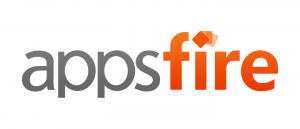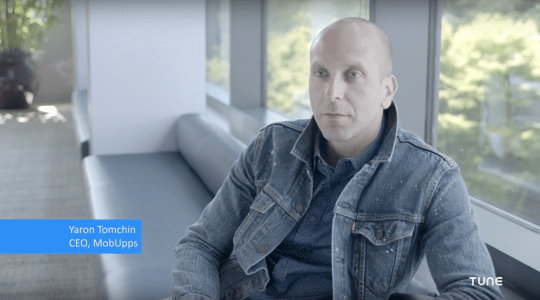 This is an interview with Ouriel Ohayon, CEO of Appsfire. He is scheduled to be a moderator at our upcoming Postback event, July 17-18.
This is an interview with Ouriel Ohayon, CEO of Appsfire. He is scheduled to be a moderator at our upcoming Postback event, July 17-18.
To begin with, tell us a little bit about your background and what you’re doing now.
Appsfire has been involved with app promotion and discovery for the past 4 years. We actually were one of the first companies to address those issues with a successful consumer guide downloaded 12 million times. For many reasons including the way Apple started to enforce new rules on app discovery we decided to fade out of that activity and leverage our knowledge to build a proprietary ad network from scratch with a big focus on user experience (some will call that native ads) where we saw a big opportunity.
 For the past 6 months we’ve released our new broad offering and are now servicing 200 publishers some of which are very large with innovative, data driven, ad monetization solutions where publishers have more control, where the deal for advertisers is transparent, performant and trick-less. What we understood also from our early days as a developer is that in order to be a successful marketing solution you can’t just stop at providing user acquisition solutions but not look beyond the download. This is why we provide a wide range of free services to publishers to improve their engagement and retention (CRM, automation, feedback, push, notifications, store metrics, deep links…) and start operating campaigns for app retargeting.
For the past 6 months we’ve released our new broad offering and are now servicing 200 publishers some of which are very large with innovative, data driven, ad monetization solutions where publishers have more control, where the deal for advertisers is transparent, performant and trick-less. What we understood also from our early days as a developer is that in order to be a successful marketing solution you can’t just stop at providing user acquisition solutions but not look beyond the download. This is why we provide a wide range of free services to publishers to improve their engagement and retention (CRM, automation, feedback, push, notifications, store metrics, deep links…) and start operating campaigns for app retargeting.
What mobile marketing trends have you noticed over the past year that have real potential to make an impact in the long-term?
User acquisition is becoming smarter and more sophisticated with better tools for buying and measuring and better managed inventory. But at the same time there have never been more backdoor solutions to hack the system from bots farms, cloning engines, fake review systems, etc. In a way mobile marketing is a very sophisticated jungle. But on the other hand, consolidation and rationalization are happening too. Bigger fishes buy smaller fishes, Apple and Google and Facebook make and enforce rules to avoid abuses and the era of the “all is possible” is over.
The true trend is also coming from the demand side: the market desperately wants better solutions than the traditional ad formats, more and more ads are ignored, accidentally clicked (or by fraud), to serve their marketing goal.
Although the mobile ad market is still oriented to mobile app install mostly and Facebook (soon Twitter and many more) are riding the waves started by others, there is a major budget shift in ad dollars from desktop for re-engagement, retargeting and performance driven offers that go beyond the app install but also from other “screens” like TV for branded campaigns.
What mistakes do you see mobile app marketers or app developers make that directly impact their ability to grow their audience?
I see mostly two mistakes: not enough focus on building an app that really stands out in its utility. With one million apps out there and app discovery that is still (and will remain) broken for many years there is no way you can make it with an app that’s just “good.” It has to shine. And that comes with obsession for the product that serves a great need (which can be simple).
The second most common mistake I see, maybe related to laziness, sometimes arrogance, is the fact that the developers behind some beautiful apps rely on their product only to grow and become a business. It’s very different to build a good app and a business. And the difference is the constant effort from inception point all the way through for marketing your app using free and paid, legit technics.
What’s the key to creating compelling and effective native ads?
There’s no magic recipe. The industry is learning. But a few indicators are already out there. Fanatical obsession for details and design matter. Users are fed up with crappy looking ads. They’ve been trained to use good looking apps for years. Just as important is the necessity to create an ad experience that goes beyond the typical “interruption.” The industry still relies on “breakout” moments to stuff ads, or use all sorts of tricks to place ads artificially in an app. But users hate it and short term success of some networks or campaign should not blind us on the necessity of changing that. It is important to find ways of blending the ads with the experience, so the “disruption” factor decreases and the effectiveness increases. Finally, honesty and ethics are equally important. If ads have to become more integrated in apps they still have to be clear to users and not deceive.
Native ads have been criticized for having an element of deception. What’s your take on this perspective? And what does the industry need to do to avoid furthering any negative perception?
I think there is a lot of confusion because this topic is kind of new (although Google has been doing sponsored native results for years). Native ads to succeed need users’ trust and advertisers’ trust. Since ads are going to be part of the experience – may that be a tweet, a search result, a pin, or sponsored app or article – users need to instantly know, without effort that an ad is an ad. Publishers and networks have to avoid falling in the tempting trap of blurring too much the line and even infringing the law (FTC is watching…). An ad is an ad. Period. It should be said, it should be looking that way and there should not be any tricks around this. Break users’ trust and you won’t be in this business for long. That is in particularly true about ads related to editorial content and journalism.
You’ve been pretty outspoken about incentivized advertising – does it have a place in the industry, or do you see it fading away in the future?
I’ll be frank, I have never been a big fan of this although I know there is a lot of money to make. At Appsfire we made the radical choice to never build on incentives. It’s not so much about the incentivized mechanism themselves but how they have been abused here and there. And overall I believe incentivized advertising for apps is a part of the past: it works to drive app installs and inflate vanity metrics at cheap cost, but does not deliver quality engaged users at scale. I believe the market understands that too.
But what I think doesn’t really matter. What really matters is that Apple seems to not like it overall although it tolerates some form of rewarded marketing with rewarded app videos or social sharing (I would not bet this will last forever…). I do believe that there is a positive way to build on incentives that are not related to the app store (coupons, discounts, goodies) and I guess many companies will likely leverage that very well to improve user acquisition or engagement.
What I believe is that in no time, because of Twitter, Youtube and Google there will be soon a major bubble of fresh non-incentivized inventory in the industry and that inefficient inventory will die or morph for the good of the industry leaving a minor room to any incentivized techniques in particular when the majority of the ad dollars will be allocated to non-app install and in-app commerce based or branding campaigns. If you have any doubt that will happen, just look at Facebook and just how successful their app business is without any incentives.
In what ways do you think app stores can make it easier for apps to be discovered?
Google understands it better than Apple. It’s about personalization. In 2014 it makes no sense whatsoever that an app store should be the same for everyone when we all have different tastes and contexts. App stores should understand us and adapt to what we are, where we are, what we like and what we intend to do. Personalization would give a better chance to long tail developers and apps that are not “hit driven.” Right now app stores are “dumb” catalogs (remember Yahoo early days?) with some toppings of editorial updated once a week. We’re not there yet.
The other thing that is really hurting the industry in my mind is the dictatorial importance of the top ranks which drives the majority of the passive discovery and which is a lot more important than search. Imagine, just for one second, what the landscape would look like if the top ranks did not exist. How much crap it would instantly remove from our industry both in terms of apps and services that have just been designed to game this system. I am not saying they have to go. But maybe Apple should consider reviewing the algorithm and maybe their placement.
Finally, I believe games should have their own store. They clearly dominate the industry in terms of revenues and app population and in a way they are shadowing all the others. Apple has started to understand that by separating the app and the games they feature weekly. But that could go deeper.
What gets you excited about the future of mobile marketing?
The fact that the industry is still not even half done. So many people are still buying portable devices, so many new innovations are coming to make better marketing at the platform and device level. We’re just beginning!
This year’s Postback event will be held July 17th & 18th in Seattle, WA. Featuring keynote addresses from Twitter and Google, 10 panel sessions with discussion from 25+ industry experts, and training for HasOffers and MobileAppTracking products, Postback is a can’t miss event for all serious marketers. The event also includes a rooftop happy hour, boat cruise along the Seattle waterfront, and a private concert, giving you plenty of opportunity to connect with other professionals in the industry. To register or learn more, visit the Postback website.
Author
Becky is the Senior Content Marketing Manager at TUNE. Before TUNE, she led a variety of marketing and communications projects at San Francisco startups. Becky received her bachelor's degree in English from Wake Forest University. After living nearly a decade in San Francisco and Seattle, she has returned to her home of Charleston, SC, where you can find her enjoying the sun and salt water with her family.




Leave a Reply
You must be logged in to post a comment.